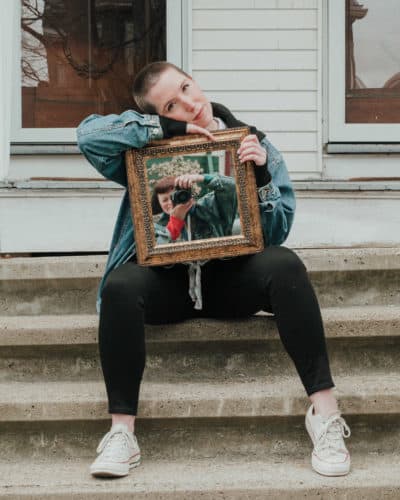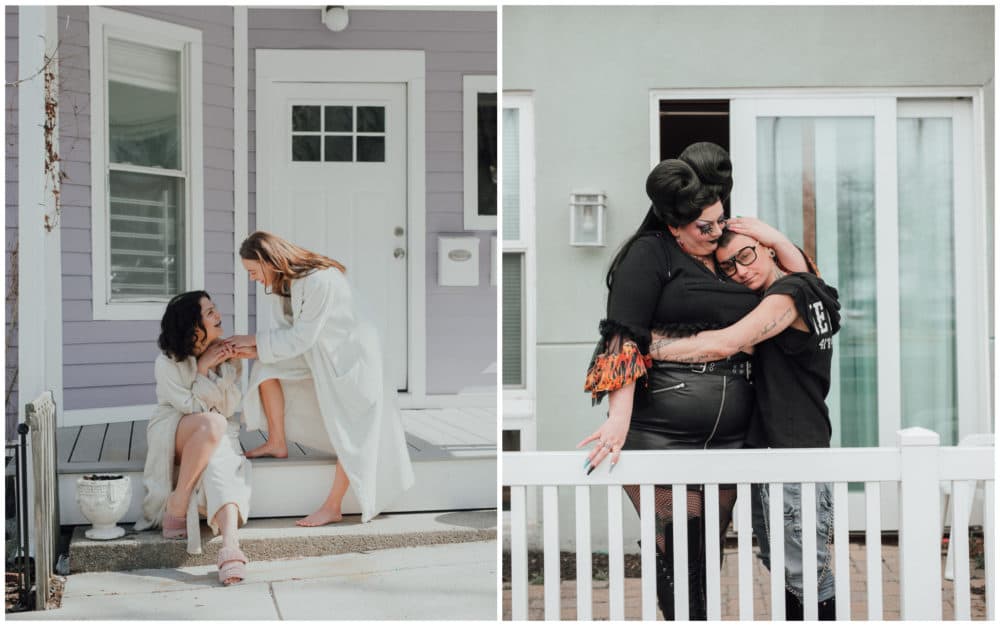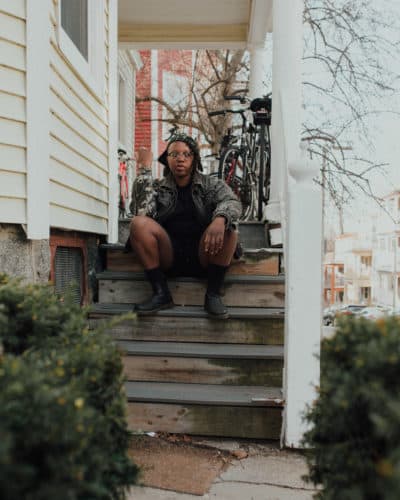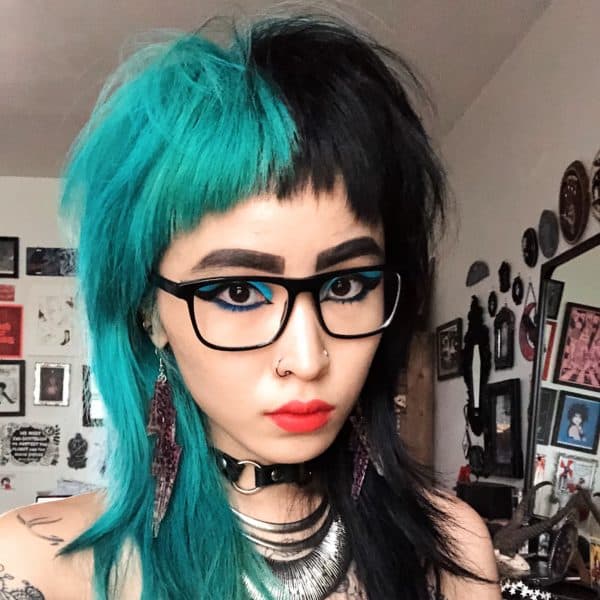Advertisement
Photo Series 'Queerantine' Offers A Front-Porch View Of Life During A Pandemic

The COVID-19 pandemic has ushered in a new era of social distancing, with many of us spending most of our time at home. With galleries, museums, music venues and theaters closed, many artists left without an income are trying to survive, but are also finding ways to be creative during this uncertain time. Ally Schmaling, a Boston photographer who focuses on capturing the queer community through vibrant portraiture, started a photography series called “Queerantine” that documents how the queer community is living through the pandemic.

As their work came to a halt, Schmaling examined how they could continue creating art that is meaningful to them. “If I didn’t have the pressure of making money, or if I wasn’t in the grip of capitalism, what is it that I would create as an artist? And it’s kind of bizarre that I actually came to that moment and I’m in that moment and this [“Queerantine”] is what I would create,” Schmaling said.
For the project, Schmaling puts out a call for shoots on Instagram. They visit different neighborhoods and cities — Jamaica Plain, Roxbury and Somerville, for example — and shoots for five to 10 minutes, standing on the sidewalk 10 feet away from the porch. They ask their subjects two questions: “What kind of small mundane, bizarre joys have you found in all of this mess?” and “In the current apocalypse that we’re in, or just in general, what does queer community look like to you? What does it feel like to you? What does it mean to you?” Schmaling started their project on March 26 and has photographed nearly 40 queer households as of this writing.
Photographers have been capturing different aspects of the COVID-19 pandemic: empty shelves at grocery stores, deserted streets and healthcare workers on the front lines. Plenty of photos capture the harshness and bleakness of the pandemic. Schmaling wanted to do something different, drawing upon their background and experience. “What is it that I can actually do to effect change as a photographer under these new guidelines?” they asked. “I wanted to kind of add my own spin and my own voice to that kind of practice. I had previously worked with queer and trans communities in Boston. I knew there were a lot of stories to tell and that I was itching to tell and to be a part of.”
The queer community faces struggles during the pandemic — a new report by the Human Rights Campaign Foundation found that the LGBTQ+ community is more likely than the general population to live in poverty with inadequate access to healthcare, paid medical leave and basic necessities. Schmaling said that the queer community is no stranger to being neglected by the government, citing the AIDS crisis as an example. “Queerness, because of that adversity, kind of requires this architecture of community compassion,” they said. “Queer people have kind of built up these networks of chosen family and of mutual aid...that kind of narrative of resiliency is really what’s coming across the more I dive into this project.”
Advertisement

Schmaling’s photos display a wide range of emotions: serenity, vivacity, stoicism and playfulness. For the photoshoots, people brought their pets and plants, coordinated their outfits with matching ethereal white robes, dressed in all black, dressed up in drag, expressed themselves through dance, and showed the art and food they’ve made — two people brought out cinnamon buns they baked. The photo series captures human connection and community resilience during a time when everything feels distant and robotic. “It’s simultaneously so intimate and so far away, so removed, and so kind of sterile in how it’s presented. The dichotomy is really beautiful to me,” Schmaling said.
Despite New Englanders’ cold archetype, Schmaling said that while photographing, they have had a lot of interactions that were the opposite of detached and unemotional — people yearn for a moment of creativity or self-expression, they said. “People are itching for a reason to be silly or to perform or to like be seen by another person. And so I think a lot of the interactions I have with people are quite goofy and quite joyful.”

When Schmaling interviews people for the series, responses range from lighthearted to profound. When Jamaica Plain roommates Anjimile and Rae were asked what brought them joy, they said, “I keep meditating on the whole idea that indigenous communities and farmers for centuries have intentionally burned fields to plant new seeds. Some seeds only germinate if they’re scarred by fire and I keep using that metaphor, that maybe this is the fire and now we can finally start planting these new seeds of better structures that serve us all.”
For now, “Queerantine” lives on Instagram, but Schmaling aspires to unite the people featured in the series for a show once it’s safe to do so. However, many things are up in the air. As a freelance artist, Schmaling has lost all their income for the foreseeable future and is adjusting to the new world of increasingly digitized communication. But Schmaling sees hope in their project and what it symbolizes. “Queerness in itself, in a more philosophical sense or intellectual sense, is this ability to imagine worlds outside of the structures that were handed to us...I think queerness is kind of synonymous with innovation and with ingenuity. And so I think we’re at kind of a standstill in society where I think we need to queer the systems, right? We need to kind of inject this radical ingenuity into systems so that they can work for all of us, not just some of us.”
Ally Schmaling is directing donations to Y2Y’s COVID-19 Emergency Fund, a student-run initiative providing safe and affirming shelter for young adults experiencing homelessness.
